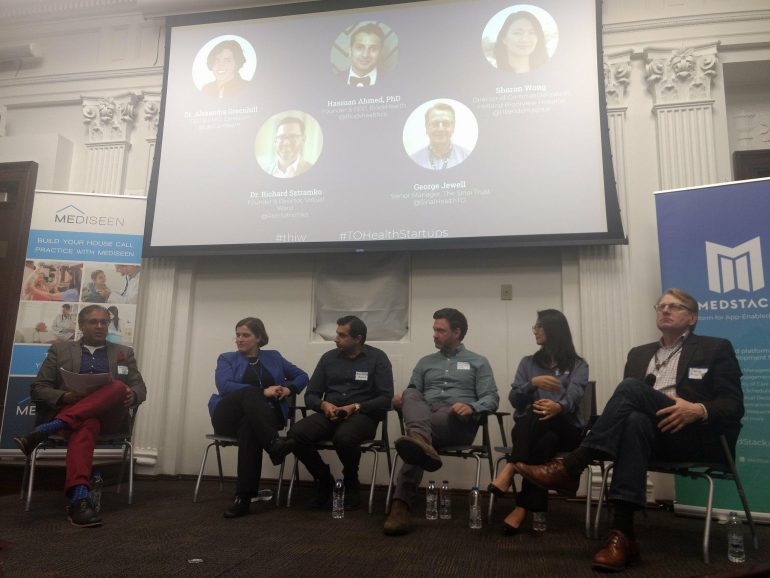As part of Toronto’s Health Innovation Week, MediSeen and MedStack hosted a ‘dual innovation panel’ tackling both sides of innovation in the Canadian healthcare ecosystem.
In one panel, startup founders and healthcare leaders tackled how startups could work better with healthcare providers, while the second panel provided insight into how startups could work with the policymakers responsible for the direction of the healthcare system.
Understandably, the slow pace at which the healthcare system adopts innovation was a challenge. Alexandra Greenhill, a physician and CEO of Careteam, described her experience moving from the healthcare system to the startup world.
“I spent over 10 years sitting in committees and at some point you say it’s insanity. Then you discover startup language and startup pace, but big organizations don’t understand language. There is no way to get meeting in the healthcare system in Canada in three weeks,” said Greenhill. “I can get on phone with Johns Hopkins and have a meeting in three days.”
Toronto Health Innovation Week!Thanks for a great Health Startup panel on how start-ups and innovative entrepreneurs tackle digital health with public sector orgs! @OntarioEMRs @keller_canada @MedStack @MediSeenHealth @avocarehealth pic.twitter.com/PklWBkH2cq
— Elizabeth Keller (@keller_canada) April 10, 2018
George Jewell, senior manager at The Sinai Trust, acknowledged the glacial pace was a challenge. He’s responsible for developing commercial relationships with healthcare partners, and generates funding for research in healthcare, and said jobs like his will increase in the future as hospitals look to engage with innovators. He suggests that healthcare providers at some point will be competing to work with certain startups.
“Hospitals say show me the evidence. The problem is startups can’t show the evidence until they have access to those patients.”
“The revolving door moves at a very slow pace,” Jewell said, using an analogy of a literal hospital door. “If you can’t push that revolving door you can’t make that door go faster, but it’s a door that goes into the hospital…I want to go quickly, but unfortunately the person in front of me might have just had a hip replacement so that door moves slowly. Think of that, hospitals tend to move slower, they can’t take risks in a lot of cases because their number one job is patient safety and patient quality.”
Sharon Wong, director of commercialization at the Holland Bloorview Kids Rehabilitation Hospital, said that this slow pace presents its own set of challenges. While it’s important that the healthcare industry manages risk, there needs to be a paradigm shift in encouraging innovation.
“I think the problem stems from practical challenges. One of them is the need for sufficient real-world evidence and speaking with a lot of the startups, companies come to me and say we have this great innovation, and hospitals say show me the evidence,” she said. “The problem is startups can’t show the evidence until they have access to those patients.”
Speaking from the startup perspective, Daniel Warner, CEO of MediSeen, expressed frustration at the fact that startups in the healthcare industry have to take extra time to move the needle. He points out that because of Canada’s fragmented system, Canadian startups are moving to the US and taking their innovation there. What are startups to do in this situation?
In response, Jewell said that it’s important for founders to engage their MPs, and acknowledged that things would be tough for a while, and that founders must be a strong advocate for their industry.
“It sounds flippant, but you have to figure out how to do that, and how you do that is to start talking to MPs and MPPs…keep pounding away, and it’s costly and there’s some that’s not gonna make it, but that’s the world we live in today.”
Disclosure: MediSeen is the healthtech sponsor for our weekly HealthTech Times newsletter

